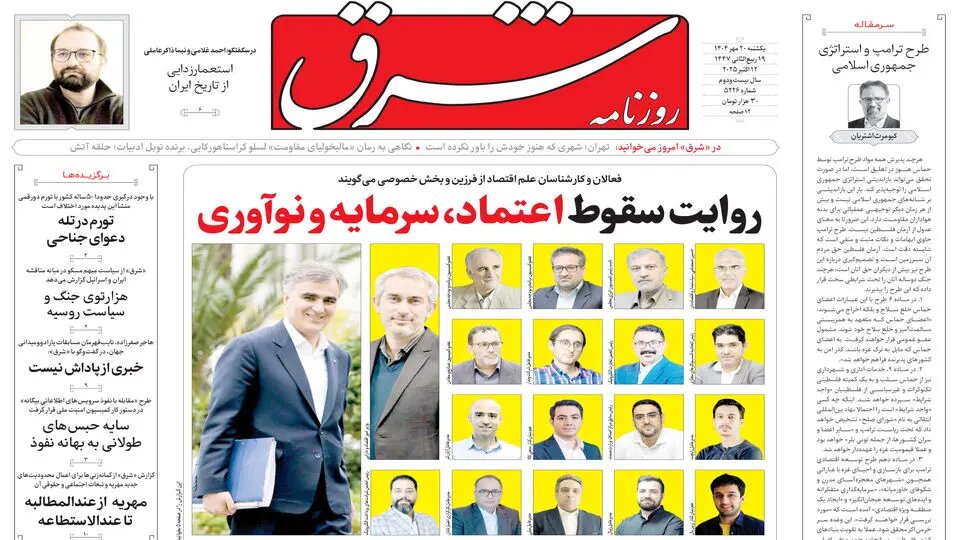Trump's Gaza plan and Iran’s strategy

TEHRAN - Shargh devoted its editorial to Trump's 20-point plan for Gaza and the strategy of the Islamic Republic toward it.
It wrote: Although Hamas' acceptance of all the articles of Trump's plan is still pending, if it is realized, it could justify rethinking the strategy of the Islamic Republic. Trump's plan contains ambiguities, positive and negative points that deserve attention. The Palestinian cause is the right of the people of that land, and it is their right more than anyone else to make decisions about this plan. The plan actually determines the operational context for the new position of the Islamic Republic. Although Iran cannot agree with the details of this plan, it practically cannot ignore a force that has been at the forefront of the Palestinian resistance and has sacrificed nearly 70,000 people in this way. Such conditions demand a theoretical rethinking of the political strategy and operational tactics of the Islamic Republic in supporting the Palestinian forces. The burden of this rethinking is not on the shoulders of the Islamic Republic, and it is justified by supporters of the resistance in Iran and the region.
Ham Mihan: Will Iran change position towards the new Syrian government?
In an interview with Dr. Hadi Borhani, an analyst of Middle East issues, Ham Mihan examined Iran's relations with the new Syrian government. The analyst believes that Iran is willing to start new relations with Syria, but two problems have prevented this from happening: first, Iran is not yet making enough efforts to repair relations with Syria, and second, we missed the good opportunity that was available when al-Sharaa came to power. At that time, al-Sharaa sent positive impulses to communicate with Iran, but we did not accept it, and now he is announcing that he caused Iran's hand to be cut off from Syria. Therefore, the conditions for restoring Iran-Syria relations have become more difficult now, but ultimately Iran must take this path and, with the help of countries such as Turkey, Saudi Arabia, and Qatar that influence the Syrian government, reach a win-win formula for reconciliation with the Syrian authorities and end the current conflict. Especially since it does not look good at all that Iran is the only country, alongside Israel, that has taken a negative stance towards the Syrian government and, like the Zionist regime, calls the Syrian leaders "terrorists."
Ettelaat: Behind the scenes of US military presence in West Asia
In an interview with international affairs analyst Seyyed Jalal Sadatian, Ettelaat analyzed the U.S. military presence in the region. Sadatian said: When the Americans are after Bagram and are already present in Azerbaijan and Al-Udeid (Qatar), it can be said that they have plans for Iran, especially when they shape the global atmosphere against Iran and say that the Iranians do not obey international rules and regulations, and therefore we are allowed to attack this country. Of course, it is well understood that the United States is aware any proposed UN Security Council resolution under Chapter VII to authorize a military invasion of Iran would be vetoed by Russia or China. The country's conditions are truly special and consultative committees must be formed so that we can safely leave behind this situation, using all our energy. The enemy is pursuing Iranophobia with all their capabilities, while unfortunately, we have not benefited much from the existing capabilities.
Iran: A normal and stable Iran is desirable for China and Russia
In an article, the Iran newspaper discussed China and Russia's views on Iran in the current situation and said: Actually, Russia and China benefit more than anything else from a stable and normal Iran in the international system. An Iran that enjoys domestic and international stability while maintaining its independent approach and strategic view of the world, the region, the East, Asia, and its neighbors can be a more reliable and effective partner for Moscow and Beijing. Therefore, contrary to the ideas of some analysts, Russia and China prefer a normal and stable Iran. They don’t want Iran caught in an ambiguous or critical situation. Of course, at certain points, some actors in these two countries may benefit from the continuation of Iran's semi-critical situation based on tactical considerations; but from a strategic point of view, Iran's stability and tranquility are more desirable for them, because a stable Iran can establish broader and more sustainable relations with the world, including with Russia and China.
Leave a Comment